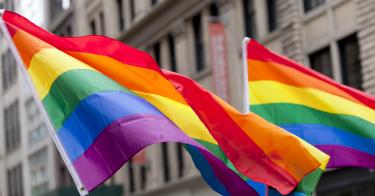Do you support religious liberty or LGBT individuals? It needn’t be an either–or proposition. Just as many who identify as LGBT hold conservative values, so many religious social conservatives count LGBT individuals among their beloved friends, family, and colleagues. This allows conservatives to take a compassionate, solution-oriented approach to addressing the problems faced by LGBT individuals. Such an approach can negate the need to treat sexual orientation and gender identity as a protected class.
In Masterpiece Cakeshop v. Colorado Civil Rights Commission, the Supreme Court ruled that “religious and philosophical objections to gay marriage are protected views and in some instances protected forms of expression.” Justice Anthony Kennedy noted in oral arguments that, in refusing to bake a cake for a same-sex wedding celebration, the baker had not discriminated on the basis of the couple’s identity. At stake was a disagreement about actions related to the meaning of marriage or, as Kennedy put it, “what they’re doing.”
While the Court rejected the notion that support for traditional marriage is ipso facto discriminatory, the Left’s “right to discriminate” narrative persists in the court of public opinion. The question therefore remains: Can there be good-faith disagreement about non-traditional marriage? The answer is yes — and conservatives hold the key to having that disagreement in a civil manner that respects everyone’s freedom. An emphasis on human dignity and the merits of civil society, values typically emphasized by social conservatives, can provide a swifter and more nuanced response to anti-LGBT bias than anti-discrimination policies.
Anti-Discrimination Law and Human Dignity
Every human being has inherent dignity and worth, regardless of age, race, sex, sexual orientation, or gender identity. This truth should dispose us to treat others with respect and compassion, even when our beliefs conflict. And that attitude should prevail, even as we honestly critique the SOGI (sexual orientation and gender identity) policies that are meant to protect the dignity and worth of LGBT people.
SOGI laws make poor policy because they fail to achieve that goal in a targeted, effective way that respects the civil liberties of others. One problem with adding SOGI to anti-discrimination law is that the categories of sexual orientation and gender identity are subjective and unverifiable. Unlike race or biological sex, sexual orientation and gender identity are, by their very definitions, fluid and subjective. Thus these terms make a poor legal standard and result in poor legal outcomes.
Moreover, it’s premature to add SOGI to anti-discrimination law. Historically, anti-discrimination laws have been instituted only when markets and civic institutions fail to overcome prejudice. Before implementing this powerful tool, one must prove the existence of serious and systemic discrimination.
Andrew Koppelman, an LGBT advocate, admits that blanket denial of service for LGBT people is rare:
Hardly any of these cases have occurred: a handful in a country of 300 million people. In all of them, the people who objected to the law were asked directly to facilitate same-sex relationships, by providing wedding, adoption, or artificial insemination services, counseling, or rental of bedrooms. There have been no claims of a right to simply refuse to deal with gay people.
Our society is already fairly tolerant, with next to no cases of people flat-out denying service to LGBT individuals solely on the basis of their sexual orientation or gender identity. What the Left often fails to realize is that true tolerance cuts both ways. Existing SOGI policies should be narrowly interpreted so that they act as shields against truly discriminatory practices, not as swords to punish religious beliefs. This approach promotes mutual tolerance and penalizes no persons for either their identity or their beliefs.
The Role of Civil Society
While discrimination against LGBT people is neither widespread nor systemic, instances of bigotry still occur. What then? Here civil society can help. Local leaders, churches, universities, and other civic institutions have the power to identify local problems. Moreover, they can influence people in a more permanent and lasting way than any rule or regulation.
By allowing civil society to formulate a personalized response to bigotry where it occurs, we can combat bigotry without threatening fundamental freedoms of speech and religion. Ultimately, both Left and Right can unite behind the common goal of ensuring compassionate and fair treatment for LGBT persons.
We all agree that LGBT people have inherent dignity and value and ought to be able to participate in public life without fear. If activists were to stop using SOGI laws to attack those who uphold the traditional definition of marriage, and conservatives were to lead with their principles — that every human life has dignity and merits respect — we could clear the way for positive social change.
What is at stake in these debates is not a “license to discriminate” but a right to live and speak according to one’s beliefs — chief among them, to show kindness and charity to all. A principled rejection of SOGI policies is not incompatible with a compassionate, solutions-based approach to the problems faced by LGBT individuals.
This piece originally appeared in National Review



